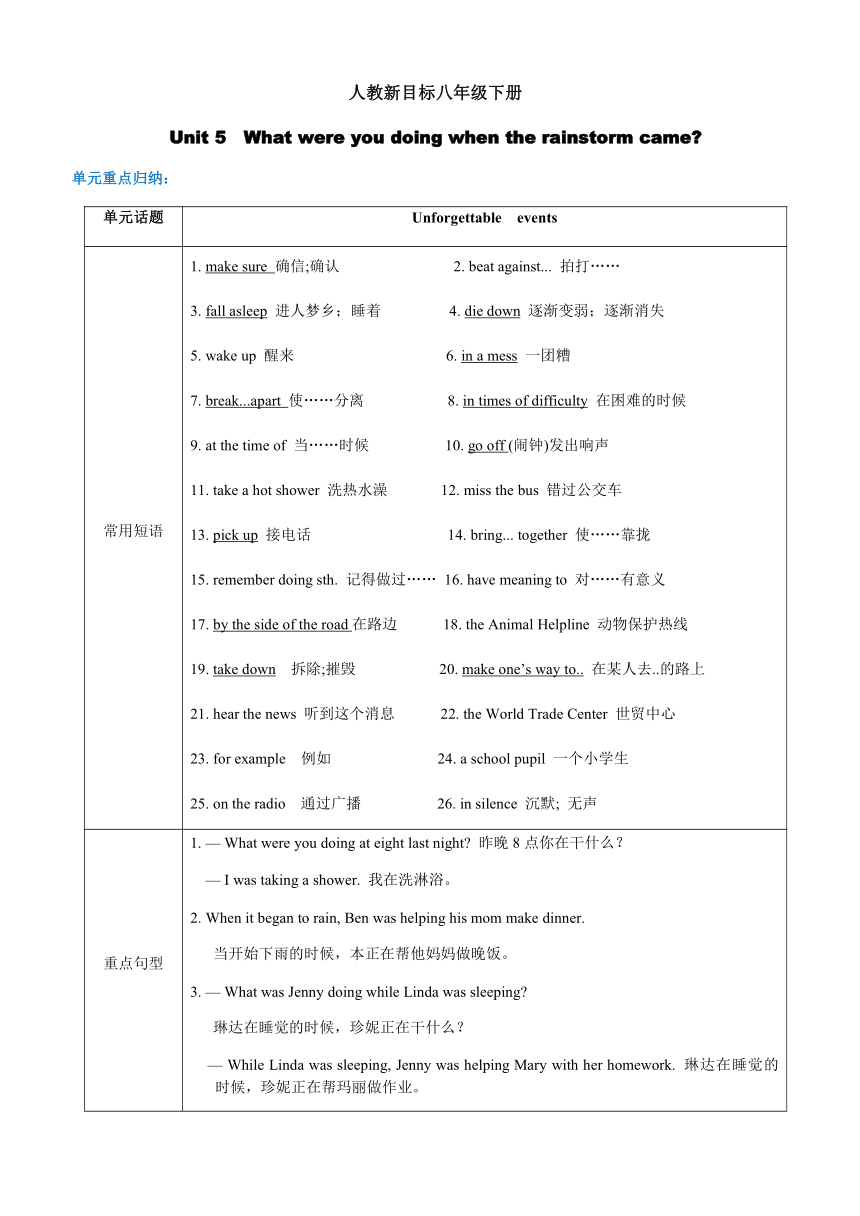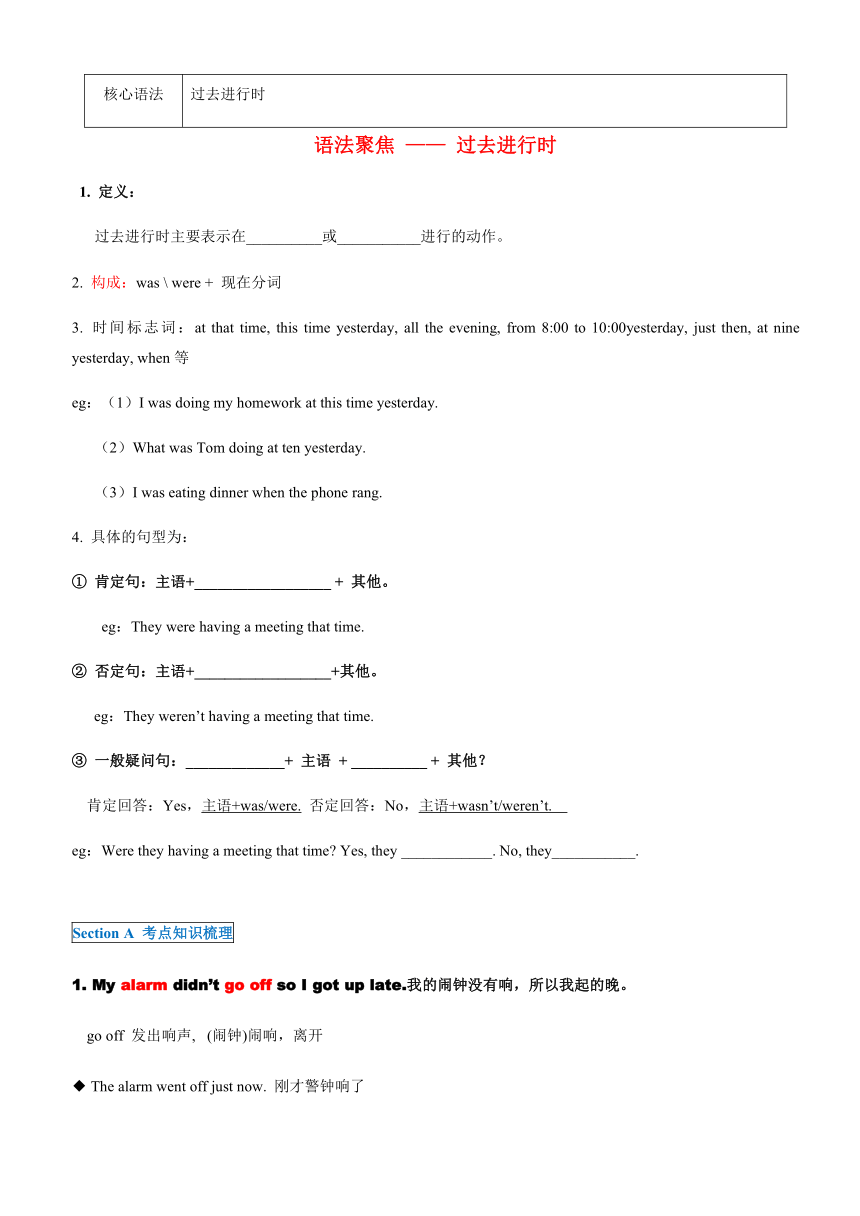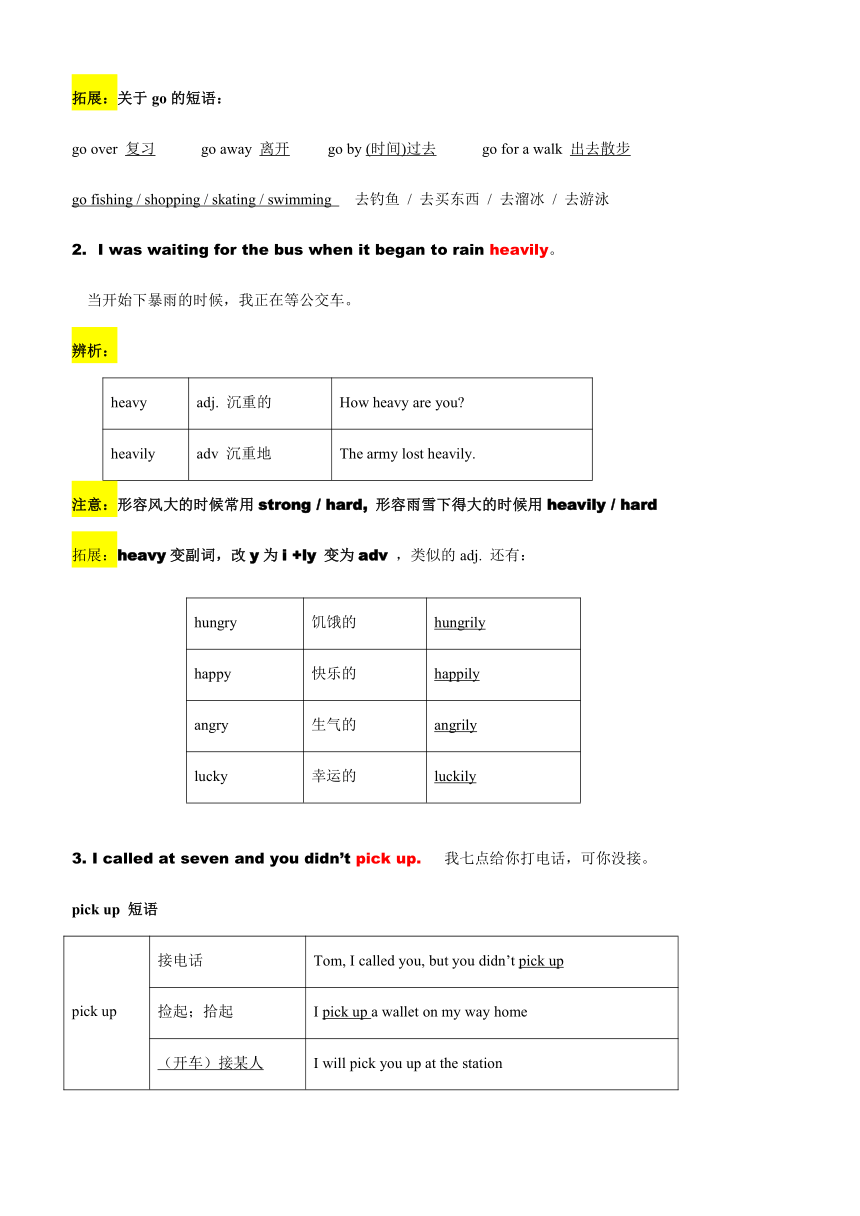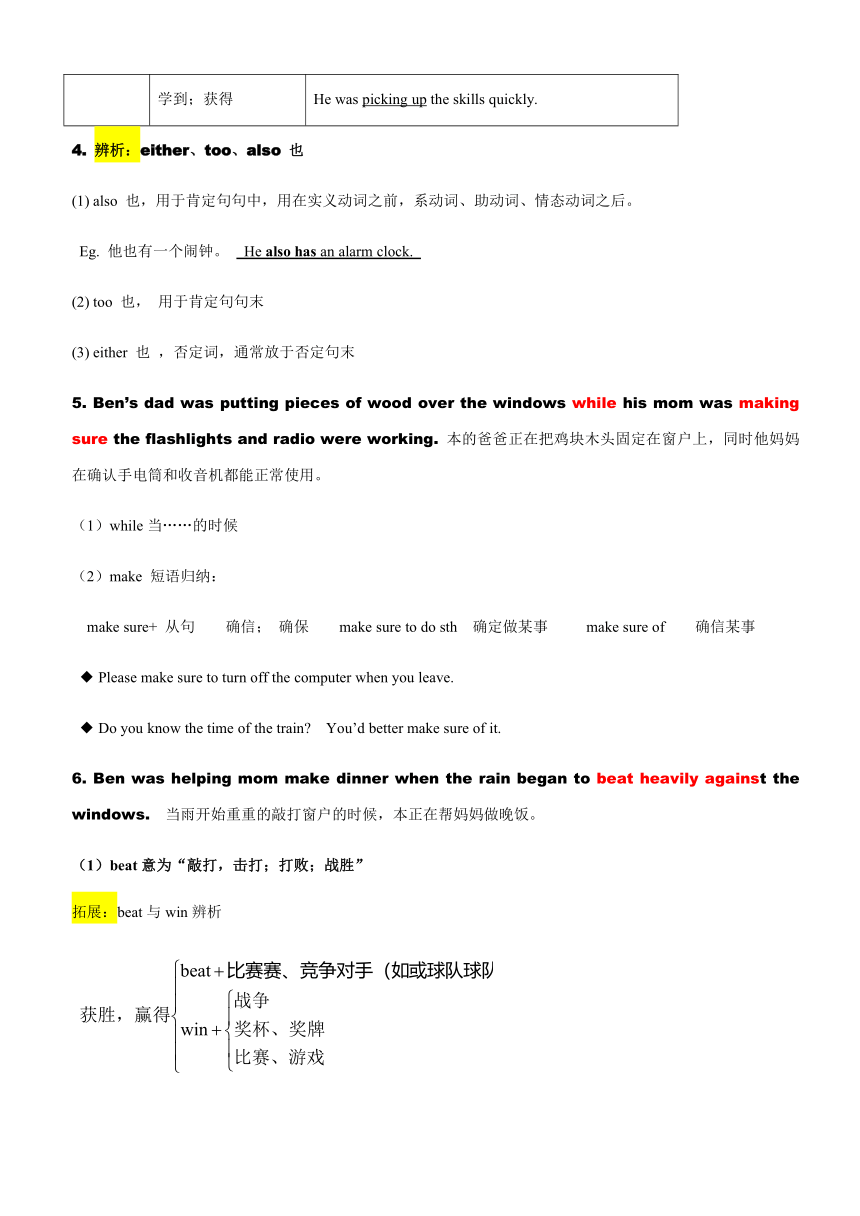人教新目标八年级下册Unit 5 What were you doing when the rainstorm came?复习学案
文档属性
| 名称 | 人教新目标八年级下册Unit 5 What were you doing when the rainstorm came?复习学案 |  | |
| 格式 | zip | ||
| 文件大小 | 52.5KB | ||
| 资源类型 | 教案 | ||
| 版本资源 | 人教新目标(Go for it)版 | ||
| 科目 | 英语 | ||
| 更新时间 | 2020-06-01 11:32:54 | ||
图片预览




文档简介
人教新目标八年级下册
Unit
5
What
were
you
doing
when
the
rainstorm
came?
单元重点归纳:
单元话题
Unforgettable
events
常用短语
1.
make
sure
确信;确认
2.
beat
against...
拍打……3.
fall
asleep
进人梦乡;睡着
4.
die
down
逐渐变弱;逐渐消失5.
wake
up
醒来
6.
in
a
mess
一团糟7.
break...apart
使……分离
8.
in
times
of
difficulty
在困难的时候9.
at
the
time
of
当……时候
10.
go
off
(闹钟)发出响声11.
take
a
hot
shower
洗热水澡
12.
miss
the
bus
错过公交车13.
pick
up
接电话
14.
bring...
together
使……靠拢15.
remember
doing
sth.
记得做过……
16.
have
meaning
to
对……有意义17.
by
the
side
of
the
road在路边
18.
the
Animal
Helpline
动物保护热线19.
take
down
拆除;摧毁
20.
make
one’s
way
to..
在某人去..的路上21.
hear
the
news
听到这个消息
22.
the
World
Trade
Center
世贸中心23.
for
example
例如
24.
a
school
pupil
一个小学生25.
on
the
radio
通过广播
26.
in
silence
沉默;
无声
重点句型
1.
—
What
were
you
doing
at
eight
last
night?
昨晚8点你在干什么?—
I
was
taking
a
shower.
我在洗淋浴。2.
When
it
began
to
rain,
Ben
was
helping
his
mom
make
dinner.
当开始下雨的时候,本正在帮他妈妈做晚饭。3.
—
What
was
Jenny
doing
while
Linda
was
sleeping?
琳达在睡觉的时候,珍妮正在干什么?—
While
Linda
was
sleeping,
Jenny
was
helping
Mary
with
her
homework.
琳达在睡觉的时候,珍妮正在帮玛丽做作业。
核心语法
过去进行时
语法聚焦
——
过去进行时
1.
定义:
过去进行时主要表示在__________或___________进行的动作。
2.
构成:was
\
were
+
现在分词
3.
时间标志词:at
that
time,
this
time
yesterday,
all
the
evening,
from
8:00
to
10:00yesterday,
just
then,
at
nine
yesterday,
when等
eg:(1)I
was
doing
my
homework
at
this
time
yesterday.
(2)What
was
Tom
doing
at
ten
yesterday.
(3)I
was
eating
dinner
when
the
phone
rang.
4.
具体的句型为:
①
肯定句:主语+__________________
+
其他。
eg:They
were
having
a
meeting
that
time.
②
否定句:主语+__________________+其他。
eg:They
weren’t
having
a
meeting
that
time.
③
一般疑问句:_____________+
主语
+
__________
+
其他?
肯定回答:Yes,主语+was/were.
否定回答:No,主语+wasn’t/weren’t.
eg:Were
they
having
a
meeting
that
time?
Yes,
they
____________.
No,
they___________.
Section
A
考点知识梳理
1.
My
alarm
didn’t
go
off
so
I
got
up
late.我的闹钟没有响,所以我起的晚。
go
off
发出响声,
?(闹钟)闹响,离开
◆
The
alarm
went
off
just
now.
刚才警钟响了
拓展:关于go的短语:
go
over
复习
go
away
离开
go
by
(时间)过去
go
for
a
walk
出去散步
go
fishing
/
shopping
/
skating
/
swimming
去钓鱼
/
去买东西
/
去溜冰
/
去游泳
2.
I
was
waiting
for
the
bus
when
it
began
to
rain
heavily。
当开始下暴雨的时候,我正在等公交车。
辨析:
heavy
adj.
沉重的
How
heavy
are
you?
heavily
adv
沉重地
The
army
lost
heavily.
注意:形容风大的时候常用strong
/
hard,
形容雨雪下得大的时候用heavily
/
hard
拓展:heavy变副词,改y为i
+ly
变为adv
,类似的adj.
还有:
hungry
饥饿的
hungrily
happy
快乐的
happily
angry
生气的
angrily
lucky
幸运的
luckily
3.
I
called
at
seven
and
you
didn’t
pick
up.
我七点给你打电话,可你没接。
pick
up
短语
pick
up
接电话
Tom,
I
called
you,
but
you
didn’t
pick
up
捡起;拾起
I
pick
up
a
wallet
on
my
way
home
(开车)接某人
I
will
pick
you
up
at
the
station
学到;获得
He
was
picking
up
the
skills
quickly.
4.
辨析:either、too、also
也
(1)
also
也,用于肯定句句中,用在实义动词之前,系动词、助动词、情态动词之后。
Eg.
他也有一个闹钟。
He
also
has
an
alarm
clock.
(2)
too
也,
用于肯定句句末
(3)
either
也
,否定词,通常放于否定句末
5.
Ben’s
dad
was
putting
pieces
of
wood
over
the
windows
while
his
mom
was
making
sure
the
flashlights
and
radio
were
working.
本的爸爸正在把鸡块木头固定在窗户上,同时他妈妈在确认手电筒和收音机都能正常使用。
(1)while当……的时候
(2)make
短语归纳:
make
sure+
从句
确信;
确保
make
sure
to
do
sth
确定做某事
make
sure
of
确信某事
◆
Please
make
sure
to
turn
off
the
computer
when
you
leave.
◆
Do
you
know
the
time
of
the
train?
You’d
better
make
sure
of
it.
6.
Ben
was
helping
mom
make
dinner
when
the
rain
began
to
beat
heavily
against
the
windows.
当雨开始重重的敲打窗户的时候,本正在帮妈妈做晚饭。
(1)beat意为“敲打,击打;打败;战胜”
拓展:beat与win辨析
◆We
beat
them
by
the
score
of
2
to
1.
我们以2:1赢了他们。
◆Which
team
won
the
football
match?
哪个对赢了那场足球赛?
(2)against
倚;碰;撞
①
反对,反义词?for。若表强烈反对,一般用副词?strongly
◆
Are?you?for?or?against?the?plan??你对这个计划是赞成还是反对呢?
②
位置,靠着、顶着、
◆
The?teacher’s?desk?is?against?the?wall.?
老师的办公桌靠墙放着。
◆
He?stood?leaning?against?the?tree.?
他站着斜靠在墙上。
7.
He
finally
fell
asleep
when
the
wind
was
dying
down
at
around
3:00
a.m.
在大约凌晨三点狂风逐渐减弱的时候,他总算睡着了。
(1)fall
asleep
进入梦乡;睡着
拓展:
①
sleep
=
be
in
bed
v
睡觉,指睡的动作状态
②
get
to
sleep
=
fall
asleep
入睡,强调进入睡眠的状态
③go
to
bed
上床睡觉,强调睡觉的动作
辨析:
be
asleep
强调睡着的状态
The
baby
is
asleep
fall
asleep
强调入睡的动作
My
father
was
so
tired
that
he
fell
asleep
quickly
(2)die
down
逐渐变弱;逐渐消失
辨析:die
down与die
out
指火的熄灭时,用die
down或die
out皆可。
die
down
往往指火势由强到弱慢慢熄灭,植物慢慢死亡这一过程;
die
out
则指熄灭这一事实,而且不及die
down用的普遍。
die
down:
反映风、声音、愤怒、掌声、战斗等平息下来。
die
out:
指家庭、种族、物种、组织、信仰等的消失或消亡。
8.
join
加入;参加
(1)
join
=
be
a
member
of
参加
,指加入某种组织,并成为其中的一员。
join
the
army
/
party
入伍/
党
join
the
club
加入俱乐部
join
in
后接活动名称
join
sb.
加入到某个人群之中
(2)
take
part
in
参加,指加入群体活动中并在活动中发挥重要作用。
SectionB
考点知识梳理
1.
When
the
school
basketball
competition
started,
Kate
was
still
making
her
way
to
school.
当校篮球赛开始的时候,凯特正在往学校赶。
make
one’s
way
to
…
在某人去……的路上(当后接地点副词时,应省略介词to)
◆
I’ll
make
my
way
home
now.我要回家了。
2.
I
looked
out
of
the
window
and
realized
that
it
was
true.
我往窗外看的时候,我意识到这是真的。
realize
v
意识到
(1)
realize
+
n
◆
she
didn’t
realize
her
mistake.
她没有意识到她的错误。
(2)
realize
+从句
◆
I
didn’t
realize
that
you
were
so
unhappy.
我没有意识到你不开心。
3.
My
parents
did
not
talk
after
that,
and
we
finished
the
rest
of
our
dinner
in
silence.
之后我的父母没有说话,我们就在沉默中吃完了剩下的晚餐。
(1)the
rest
of
…
其余的,剩下的,
做主语时,其谓语动词的数要与the
rest
of
修饰的名词一致。
◆
The
rest
of
meat
goes
bad.
剩下的米饭坏掉了。
◆The
rest
of
workers
are
still
working
hard.剩余的人仍在努力工作。
(2)silence
n
沉默
→
silent
沉默;缄默;无声
in
silence
沉默地、无声地
=
silently
keep
silent
保持沉默
4.
remember
to
do
sth与remember
doing
sth的用法区别。
(1)
remember
to
do
sth记得去做某事(此事还未做)
◆
Remember
to
turn
off
the
light
when
you
leave
the
room.
当你离开房间的时候记得关灯。
(2)
remember
doing
sth记得做过某事(此事已做完)
◆
I
remember
turning
off
the
light
when
I
left
the
room.
我记得离开房间时关灯了。
5.
surprise
v
使吃惊→surprising
adj.
令人吃惊的
→surprised
adj.
吃惊的
(1)
be
surprised
to
do
sth
对做某事很吃惊
(2)
to
one’s
surprise
使某人吃惊的是
(3)
in
surprise
吃惊地
(4)
be
surprised
at
对……感到吃惊
6.
hear
的用法
(1)
hear
sb.
do
sth听见某人做某事;
(2)
hear
sb.
doing
sth听见某人正在做某事
◆
We
can
often
hear
some
children
play
on
the
playground.
我们经常能听见一些孩子在操场上玩耍。
◆
I
heard
my
sister
singing
an
English
song
in
her
room
when
I
came
back.
hear也有听说之意,后接that引导的宾语从句。
(3)
hear
about听说=
hear
of,后面接词或短语。
◆
I
have
heard
about/of
the
story
before.
我以前就听说过这个故事。
(4)
hear
from
收到……的来信;有……的消息=
get
/
receive
a
letter
from.
◆
I
haven’t
heard
from
my
good
friend
for
months.
我已经好几个月没有收到我对的好朋友的来信了。
7.
trouble
n
困难;
苦恼;
忧虑
(1)
in
trouble
处于困境中
get
sb.
into
trouble
使某人陷入困境
(2)
What's
the
trouble
with
you?
=
What’s
the
matter
with
you?
=
Wha’t
wrong
with
you?
你怎么啦?
(3)
have
trouble(in)doing
sth
做某事有麻烦
(4)
have
problem
/difficulty/fun
(in)
doing
sth
做某事有问题/困难/乐趣
Unit
5
What
were
you
doing
when
the
rainstorm
came?
单元重点归纳:
单元话题
Unforgettable
events
常用短语
1.
make
sure
确信;确认
2.
beat
against...
拍打……3.
fall
asleep
进人梦乡;睡着
4.
die
down
逐渐变弱;逐渐消失5.
wake
up
醒来
6.
in
a
mess
一团糟7.
break...apart
使……分离
8.
in
times
of
difficulty
在困难的时候9.
at
the
time
of
当……时候
10.
go
off
(闹钟)发出响声11.
take
a
hot
shower
洗热水澡
12.
miss
the
bus
错过公交车13.
pick
up
接电话
14.
bring...
together
使……靠拢15.
remember
doing
sth.
记得做过……
16.
have
meaning
to
对……有意义17.
by
the
side
of
the
road在路边
18.
the
Animal
Helpline
动物保护热线19.
take
down
拆除;摧毁
20.
make
one’s
way
to..
在某人去..的路上21.
hear
the
news
听到这个消息
22.
the
World
Trade
Center
世贸中心23.
for
example
例如
24.
a
school
pupil
一个小学生25.
on
the
radio
通过广播
26.
in
silence
沉默;
无声
重点句型
1.
—
What
were
you
doing
at
eight
last
night?
昨晚8点你在干什么?—
I
was
taking
a
shower.
我在洗淋浴。2.
When
it
began
to
rain,
Ben
was
helping
his
mom
make
dinner.
当开始下雨的时候,本正在帮他妈妈做晚饭。3.
—
What
was
Jenny
doing
while
Linda
was
sleeping?
琳达在睡觉的时候,珍妮正在干什么?—
While
Linda
was
sleeping,
Jenny
was
helping
Mary
with
her
homework.
琳达在睡觉的时候,珍妮正在帮玛丽做作业。
核心语法
过去进行时
语法聚焦
——
过去进行时
1.
定义:
过去进行时主要表示在__________或___________进行的动作。
2.
构成:was
\
were
+
现在分词
3.
时间标志词:at
that
time,
this
time
yesterday,
all
the
evening,
from
8:00
to
10:00yesterday,
just
then,
at
nine
yesterday,
when等
eg:(1)I
was
doing
my
homework
at
this
time
yesterday.
(2)What
was
Tom
doing
at
ten
yesterday.
(3)I
was
eating
dinner
when
the
phone
rang.
4.
具体的句型为:
①
肯定句:主语+__________________
+
其他。
eg:They
were
having
a
meeting
that
time.
②
否定句:主语+__________________+其他。
eg:They
weren’t
having
a
meeting
that
time.
③
一般疑问句:_____________+
主语
+
__________
+
其他?
肯定回答:Yes,主语+was/were.
否定回答:No,主语+wasn’t/weren’t.
eg:Were
they
having
a
meeting
that
time?
Yes,
they
____________.
No,
they___________.
Section
A
考点知识梳理
1.
My
alarm
didn’t
go
off
so
I
got
up
late.我的闹钟没有响,所以我起的晚。
go
off
发出响声,
?(闹钟)闹响,离开
◆
The
alarm
went
off
just
now.
刚才警钟响了
拓展:关于go的短语:
go
over
复习
go
away
离开
go
by
(时间)过去
go
for
a
walk
出去散步
go
fishing
/
shopping
/
skating
/
swimming
去钓鱼
/
去买东西
/
去溜冰
/
去游泳
2.
I
was
waiting
for
the
bus
when
it
began
to
rain
heavily。
当开始下暴雨的时候,我正在等公交车。
辨析:
heavy
adj.
沉重的
How
heavy
are
you?
heavily
adv
沉重地
The
army
lost
heavily.
注意:形容风大的时候常用strong
/
hard,
形容雨雪下得大的时候用heavily
/
hard
拓展:heavy变副词,改y为i
+ly
变为adv
,类似的adj.
还有:
hungry
饥饿的
hungrily
happy
快乐的
happily
angry
生气的
angrily
lucky
幸运的
luckily
3.
I
called
at
seven
and
you
didn’t
pick
up.
我七点给你打电话,可你没接。
pick
up
短语
pick
up
接电话
Tom,
I
called
you,
but
you
didn’t
pick
up
捡起;拾起
I
pick
up
a
wallet
on
my
way
home
(开车)接某人
I
will
pick
you
up
at
the
station
学到;获得
He
was
picking
up
the
skills
quickly.
4.
辨析:either、too、also
也
(1)
also
也,用于肯定句句中,用在实义动词之前,系动词、助动词、情态动词之后。
Eg.
他也有一个闹钟。
He
also
has
an
alarm
clock.
(2)
too
也,
用于肯定句句末
(3)
either
也
,否定词,通常放于否定句末
5.
Ben’s
dad
was
putting
pieces
of
wood
over
the
windows
while
his
mom
was
making
sure
the
flashlights
and
radio
were
working.
本的爸爸正在把鸡块木头固定在窗户上,同时他妈妈在确认手电筒和收音机都能正常使用。
(1)while当……的时候
(2)make
短语归纳:
make
sure+
从句
确信;
确保
make
sure
to
do
sth
确定做某事
make
sure
of
确信某事
◆
Please
make
sure
to
turn
off
the
computer
when
you
leave.
◆
Do
you
know
the
time
of
the
train?
You’d
better
make
sure
of
it.
6.
Ben
was
helping
mom
make
dinner
when
the
rain
began
to
beat
heavily
against
the
windows.
当雨开始重重的敲打窗户的时候,本正在帮妈妈做晚饭。
(1)beat意为“敲打,击打;打败;战胜”
拓展:beat与win辨析
◆We
beat
them
by
the
score
of
2
to
1.
我们以2:1赢了他们。
◆Which
team
won
the
football
match?
哪个对赢了那场足球赛?
(2)against
倚;碰;撞
①
反对,反义词?for。若表强烈反对,一般用副词?strongly
◆
Are?you?for?or?against?the?plan??你对这个计划是赞成还是反对呢?
②
位置,靠着、顶着、
◆
The?teacher’s?desk?is?against?the?wall.?
老师的办公桌靠墙放着。
◆
He?stood?leaning?against?the?tree.?
他站着斜靠在墙上。
7.
He
finally
fell
asleep
when
the
wind
was
dying
down
at
around
3:00
a.m.
在大约凌晨三点狂风逐渐减弱的时候,他总算睡着了。
(1)fall
asleep
进入梦乡;睡着
拓展:
①
sleep
=
be
in
bed
v
睡觉,指睡的动作状态
②
get
to
sleep
=
fall
asleep
入睡,强调进入睡眠的状态
③go
to
bed
上床睡觉,强调睡觉的动作
辨析:
be
asleep
强调睡着的状态
The
baby
is
asleep
fall
asleep
强调入睡的动作
My
father
was
so
tired
that
he
fell
asleep
quickly
(2)die
down
逐渐变弱;逐渐消失
辨析:die
down与die
out
指火的熄灭时,用die
down或die
out皆可。
die
down
往往指火势由强到弱慢慢熄灭,植物慢慢死亡这一过程;
die
out
则指熄灭这一事实,而且不及die
down用的普遍。
die
down:
反映风、声音、愤怒、掌声、战斗等平息下来。
die
out:
指家庭、种族、物种、组织、信仰等的消失或消亡。
8.
join
加入;参加
(1)
join
=
be
a
member
of
参加
,指加入某种组织,并成为其中的一员。
join
the
army
/
party
入伍/
党
join
the
club
加入俱乐部
join
in
后接活动名称
join
sb.
加入到某个人群之中
(2)
take
part
in
参加,指加入群体活动中并在活动中发挥重要作用。
SectionB
考点知识梳理
1.
When
the
school
basketball
competition
started,
Kate
was
still
making
her
way
to
school.
当校篮球赛开始的时候,凯特正在往学校赶。
make
one’s
way
to
…
在某人去……的路上(当后接地点副词时,应省略介词to)
◆
I’ll
make
my
way
home
now.我要回家了。
2.
I
looked
out
of
the
window
and
realized
that
it
was
true.
我往窗外看的时候,我意识到这是真的。
realize
v
意识到
(1)
realize
+
n
◆
she
didn’t
realize
her
mistake.
她没有意识到她的错误。
(2)
realize
+从句
◆
I
didn’t
realize
that
you
were
so
unhappy.
我没有意识到你不开心。
3.
My
parents
did
not
talk
after
that,
and
we
finished
the
rest
of
our
dinner
in
silence.
之后我的父母没有说话,我们就在沉默中吃完了剩下的晚餐。
(1)the
rest
of
…
其余的,剩下的,
做主语时,其谓语动词的数要与the
rest
of
修饰的名词一致。
◆
The
rest
of
meat
goes
bad.
剩下的米饭坏掉了。
◆The
rest
of
workers
are
still
working
hard.剩余的人仍在努力工作。
(2)silence
n
沉默
→
silent
沉默;缄默;无声
in
silence
沉默地、无声地
=
silently
keep
silent
保持沉默
4.
remember
to
do
sth与remember
doing
sth的用法区别。
(1)
remember
to
do
sth记得去做某事(此事还未做)
◆
Remember
to
turn
off
the
light
when
you
leave
the
room.
当你离开房间的时候记得关灯。
(2)
remember
doing
sth记得做过某事(此事已做完)
◆
I
remember
turning
off
the
light
when
I
left
the
room.
我记得离开房间时关灯了。
5.
surprise
v
使吃惊→surprising
adj.
令人吃惊的
→surprised
adj.
吃惊的
(1)
be
surprised
to
do
sth
对做某事很吃惊
(2)
to
one’s
surprise
使某人吃惊的是
(3)
in
surprise
吃惊地
(4)
be
surprised
at
对……感到吃惊
6.
hear
的用法
(1)
hear
sb.
do
sth听见某人做某事;
(2)
hear
sb.
doing
sth听见某人正在做某事
◆
We
can
often
hear
some
children
play
on
the
playground.
我们经常能听见一些孩子在操场上玩耍。
◆
I
heard
my
sister
singing
an
English
song
in
her
room
when
I
came
back.
hear也有听说之意,后接that引导的宾语从句。
(3)
hear
about听说=
hear
of,后面接词或短语。
◆
I
have
heard
about/of
the
story
before.
我以前就听说过这个故事。
(4)
hear
from
收到……的来信;有……的消息=
get
/
receive
a
letter
from.
◆
I
haven’t
heard
from
my
good
friend
for
months.
我已经好几个月没有收到我对的好朋友的来信了。
7.
trouble
n
困难;
苦恼;
忧虑
(1)
in
trouble
处于困境中
get
sb.
into
trouble
使某人陷入困境
(2)
What's
the
trouble
with
you?
=
What’s
the
matter
with
you?
=
Wha’t
wrong
with
you?
你怎么啦?
(3)
have
trouble(in)doing
sth
做某事有麻烦
(4)
have
problem
/difficulty/fun
(in)
doing
sth
做某事有问题/困难/乐趣
同课章节目录
- Unit 1 What's the matter?
- Section A
- Section B
- Unit 2 I'll help to clean up the city parks.
- Section A
- Section B
- Unit 3 Could you please clean your room?
- Section A
- Section B
- Unit 4 Why don't you talk to your parents?
- Section A
- Section B
- Unit 5 What were you doing when the rainstorm came
- Section A
- Section B
- Review of Units 1-5
- Unit 6 An old man tried to move the mountains.
- Section A
- Section B
- Unit 7 What's the highest mountain in the world?
- Section A
- Section B
- Unit 8 Have you read Treasure Island yet?
- Section A
- Section B
- Unit 9 Have you ever been to a museum?
- Section A
- Section B
- Unit 10 I've had this bike for three years.
- Section A
- Section B
